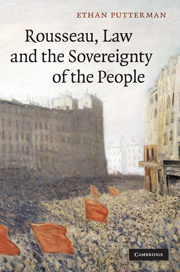Book contents
- Frontmatter
- Contents
- Acknowledgments
- A note on the text
- List of abbreviations
- Introduction: The celestial voice
- 1 Rousseau's concept of law
- 2 Agenda-setting and majority rule
- 3 Democracy and vote rigging
- 4 Popular sovereignty and the republican fear of large assemblies
- 5 Enforcing the laws in Poland and Corsica
- 6 Judging the laws/when legislation fails
- Conclusion: Law and liberty
- Select bibliography
- Name index
- Subject index
2 - Agenda-setting and majority rule
Published online by Cambridge University Press: 04 August 2010
- Frontmatter
- Contents
- Acknowledgments
- A note on the text
- List of abbreviations
- Introduction: The celestial voice
- 1 Rousseau's concept of law
- 2 Agenda-setting and majority rule
- 3 Democracy and vote rigging
- 4 Popular sovereignty and the republican fear of large assemblies
- 5 Enforcing the laws in Poland and Corsica
- 6 Judging the laws/when legislation fails
- Conclusion: Law and liberty
- Select bibliography
- Name index
- Subject index
Summary
According to Carole Pateman a central tenet of “strong democracy” and other contemporary theories of participatory democracy is the belief that the “more that individuals participate” in self-governance “the better able they become to do so.” More valuable than expert guidance by an elected elite is the political education received from democratic participation under conditions of political equality. Knowledge of how to govern is “communal and consensual” and through the holding of televised debates, town hall meetings, referendums, plebiscites, open ballot initiatives and other practical expressions of citizen self-rule, the people “deepen” the quality of democracy by expressing their will directly. Although the people may lack certain forms of specialized knowledge and technical skill, over time this void will be filled because “the pragmatic and self-regulating character of democratic politics” makes “political knowledge autonomous.” Challenging this view, twentieth-century critics of participatory democracy routinely emphasize government's need for specialized competency and legislative expertise. They argue that it is impractical, if not utopian, to believe that a majority can or should legislate the laws without critical intervention by experts. Requisite for overcoming the logistical difficulties of size and numbers, agenda-setting by a professional body or class of legislators makes possible enlightened lawmaking. As Thomas Hobbes wrote back in 1642, “very few in a great Assembly of men understand” by “what goods the Country is nourished, and defended” or are able “to advise rightly of all things conducing to the preservation of a Common-weal.”
- Type
- Chapter
- Information
- Rousseau, Law and the Sovereignty of the People , pp. 40 - 71Publisher: Cambridge University PressPrint publication year: 2010



